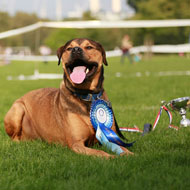
Formerly terrified of people, Barney has overcome his fears with a loving new family
After an unlucky start in life, Rottweiler cross Barney has become this year's Best Battersea Dog. Once petrified of strangers, the loveable cross is now brimming with confidence.
Barney first arrived at Battersea Dogs and Cats Home in 2011. He was so terrified of new people that he would cower in the back of his kennel, too frightened to go anywhere near people, particularly men.
Known at the time as Benny, he appeared on the hit ITV show, Paul O'Grady: For the Love of Dogs, and would even hide away from Paul himself.
Barney was initially rehomed but then brought back two days later as his owners decided he was too big for their home.
Battersea staff had to work hard to gain his trust and eventually they found him a new home with the perfect owners, the Tuckwell family from Welling in Kent.
Today, thanks to the patience and love of both Battersea staff and his new family, Barney is a different dog.
Barney's owner Ian says: "I can’t put it into words how happy I’m feeling about Barney winning Best Battersea Dog. He was just so terrified of the world and now he’s a different dog to the one I first met in kennels. He’s come such a long way and I’m really proud of him. He truly is a Battersea success story.
Barney stole the hearts of the judges at the charity's twentieth annual reunion fun day this month and is now an "Ambassadog", taking his place with previous winners of the Best Battersea Dog title.
Rob Young, Battersea's head of rehoming, said: "A dog like Barney really deserves this recognition as he’s made such a huge transformation from the dog we first knew in our kennels.
"t just shows you that with some training and a lot of love, a dog can change from being really scared to self-assured. Everyone at Battersea is so proud of Barney and his family, they’ve done such an incredible job with him."
Image courtesy of Battersea Dogs and Cats Home



 The Veterinary Medicines Directorate (VMD) is inviting applications from veterinary students to attend a one-week extramural studies (EMS) placement in July 2026.
The Veterinary Medicines Directorate (VMD) is inviting applications from veterinary students to attend a one-week extramural studies (EMS) placement in July 2026.